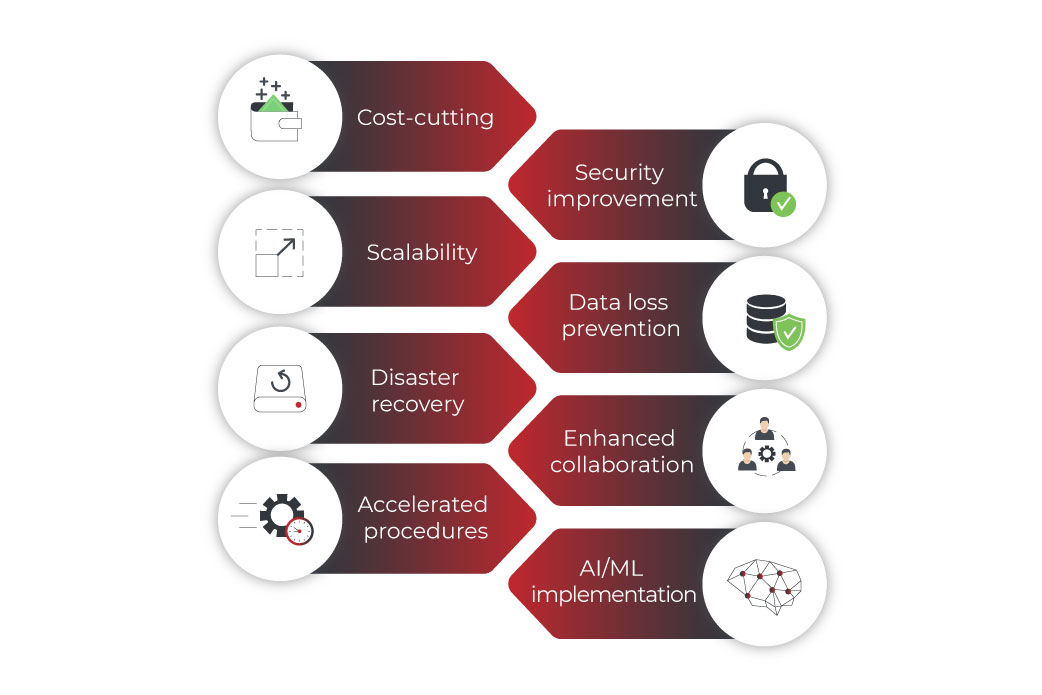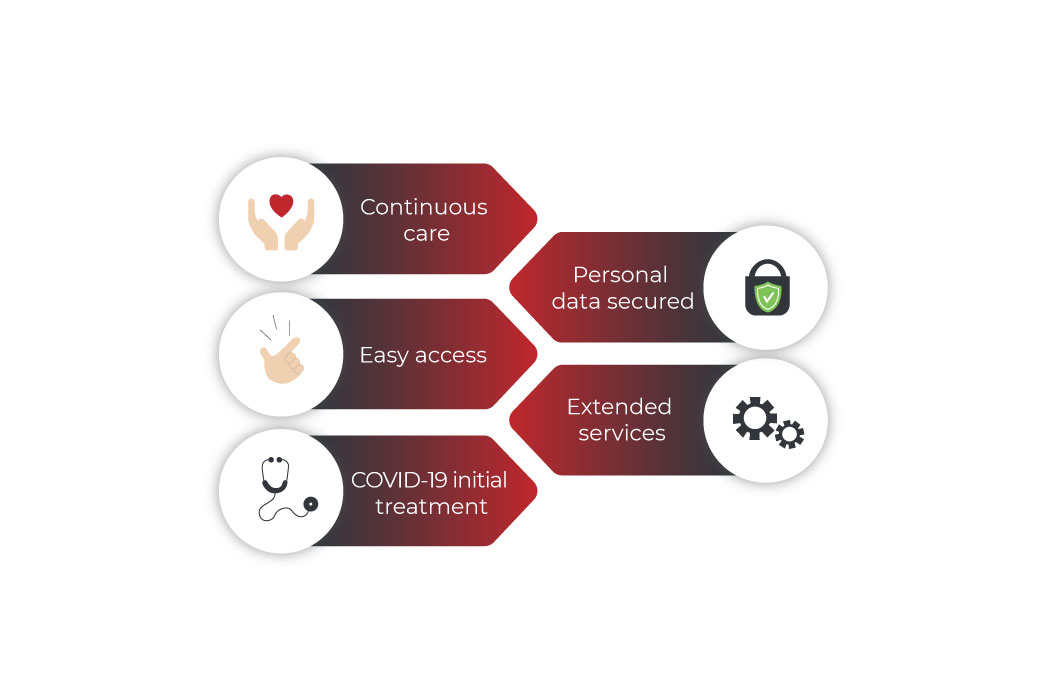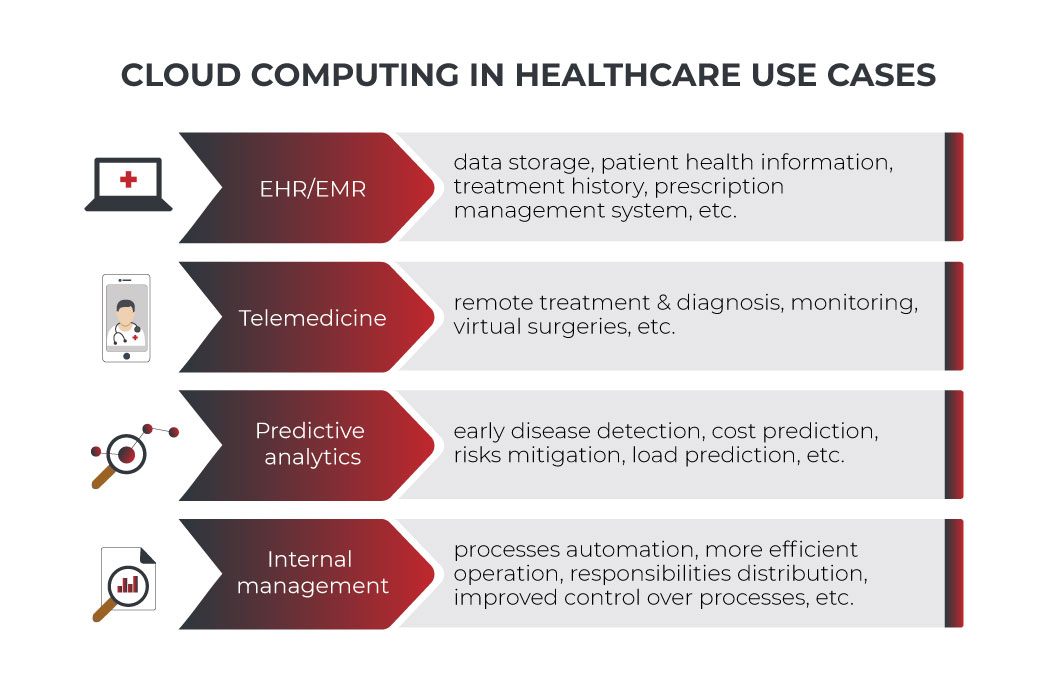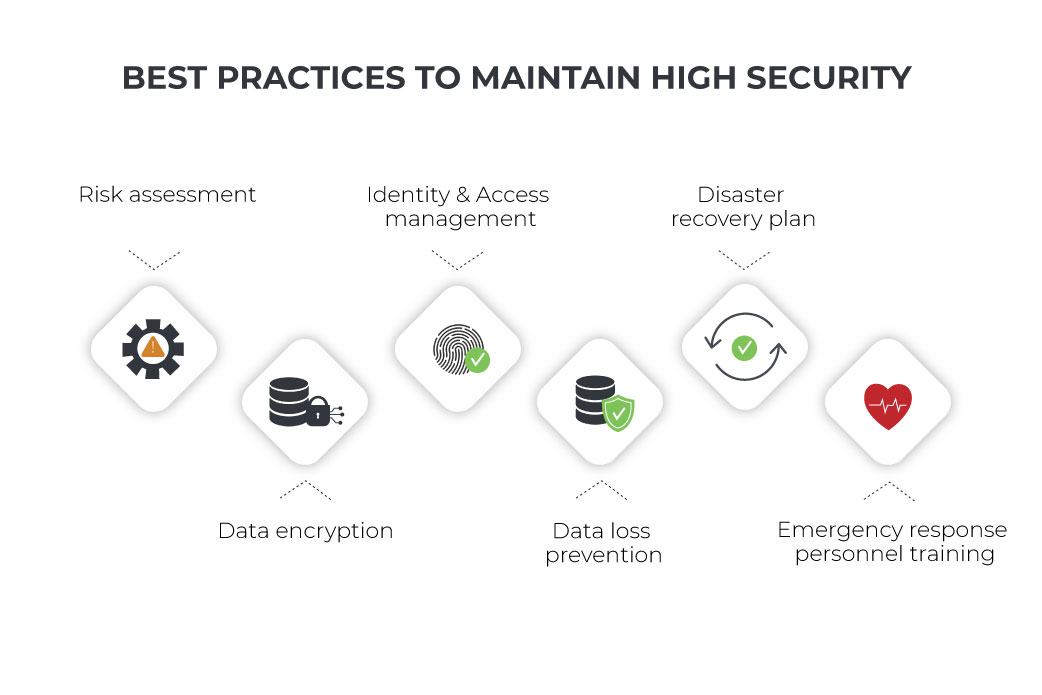Cloud computing in the healthcare industry – the next necessary step

The technological development and global shifting towards the digitalization of all types of enterprises led to the fact that the healthcare institutions today are not just companies providing their patient care services, but the enterprises hugely dependent on the IT infrastructure.
There is nothing surprising in this since modern conditions and trends are forcing medical institutions to move into the digital space and provide their services remotely and more effectively than in fully offline mode. Tasks such as E-prescription tracking, recipe prescription, and pills delivery, as well as remote consultations, have long become an ordinary demand among patients from various clinics.
Of course, no one requires healthcare institutions to handle all IT processes that inevitably arise after successful digitalization. That is why cloud computing in healthcare industry is attracting more and more followers. Unfortunately, it is not only technological development and increasing requirements that determine the growing popularity of cloud healthcare software.
COVID-19: There is no more reflection period
Perhaps it is difficult to find such an aspect of our life that would not be affected by COVID-19 in one way or another. The total lockdown, the paralysis of the world trade and economies of the countries have caused enormous damage to the global economy. Likewise, millions of victims around the world have become a brutal but harsh reminder to humanity that we must rally around global healthcare. But there is also a bright side. The terrible pandemic, which entailed so many casualties, left no doubt: the medicine and the healthcare industry should go digital as much as possible, at least in those aspects where it is an option.
It is no longer a secret that the result of the pandemic and the lockdown was a huge influx of interest in telemedicine, both from patients and from medical institutions. Telemedicine solutions allowed hospitals to at least slightly relieve the burden of new patients that they experienced at the peak of the pandemic. This small gap allowed therapists to provide remote consultations to those patients who did not show severe symptoms. The result was the unloading that doctors needed so much, which made it possible to stabilize the influx of severe patients and to establish the process of providing medical services.
Today, when COVID-19 mutates and new strains like Omicron threaten us with new problems, no one doubts the correctness of the chosen path towards the digitalization of the entire healthcare industry. Telemedicine, ??R and ??R systems, symptom-tracking apps and so on – all this should not become a temporary security measure during a pandemic but should be a new social paradigm. And cloud computing solutions can be of great help in this matter.
Why apply cloud computing in healthcare?
The global healthcare cloud computing market is predicted to reach an inspiring $76.8 billion by 2026, and there are reasons for such a rise. By its nature, the term “cloud” reflects all the advantages that the Internet has given us. Remoteness, distribution, security. Companies choose cloud computing because it helps them handle internal IT processes without wasting resources on maintaining a large-scale IT infrastructure. And here you can already see the main reason why healthcare institutions prefer to choose cloud computing services. Unlike software development vendors, healthcare providers do not always have the opportunity to assemble their own extensive IT team, which will handle all the processes associated with the hospital’s digital presence. And to tell the truth, healthcare representatives are not obliged to do this, unless we are talking about a company that has developed its own product, for example, a mobile healthcare application.
So, due to the fact that in the cloud you can get a whole range of services for hosting servers and storage, medical institutions give the cloud their preference. But this is not the only reason for the cloud’s popularity in this industry. What problem do we immediately think about when it comes to the healthcare industry? That’s right, security. Due to the fact that this industry in its specifics works with the most sensitive patient data, the security of storing this data plays a key role. In history, there have been cases of hospitals that moved into digital space, began to receive a huge amount of medical data from patients, but were not able to provide reliable storage of this data. As a result, such databases became a tasty morsel for fraudsters.
Cloud architecture allows data to be stored on multiple remote and distributed servers. In addition, healthcare cloud computing companies often offer a wide range of features and activities aimed at improving the security of data storage and the operation of the cloud service in general.
Having discussed the main reasons for the popularity of cloud storage in healthcare industry, let’s discuss the main advantages.
Benefits of cloud computing in healthcare for medical institutions

The main advantage of cloud computing in healthcare industry is, of course, how the use of this technology reduces the distance between patients and medical institutions, simplifying the communication process. The main task of all healthcare institutions remains qualified patient treatment and cloud technology is giving momentum to this process. Let’s take a closer look at the benefits of cloud computing in the health care industry.
Cost-cutting
Maintaining the IT infrastructure of a healthcare facility is expensive. The transition to the cloud will significantly reduce these costs, as the entire architecture, servers, data storage, and all processes will now take place in the cloud and will be supported either by specialists on the cloud vendor side or by a fairly small team of IT specialists from the medical institution. Cloud computing in healthcare allows reducing the costs of up to 75% that modern healthcare companies usually spend on maintaining internal infrastructure and data storage means. These resources can be spent on further enhancement of patient treatment. Supporting offline servers and hardware is an outdated method that can be useful for large product companies, but not for healthcare providers of any sort.
Security improvement
When it comes to the healthcare industry, one of the main problems, as well as the main indicator of a healthcare company’s trust, is the data security and general protection of the system. Possessing valuable and important patient data, healthcare organizations become a tasty morsel for a wide variety of attacks and intrusions. Cloud computing solutions have extensive tools to improve the protection of user data and the system as a whole.
First of all, the cloud infrastructure itself allows you to configure advanced firewalls and security protocols. Also, it is possible to restrict the possibilities of connecting to the system only for dedicated channels. Of course, all functionality of cloud solutions is created taking into account HIPAA requirements, including automatic encryption of data transmission. Finally, Cloud providers are working on an understandable and versatile disaster recovery policy, according to which the system will respond in time to any suspicious behavior or intrusion attempts.
Another pleasant bonus is the presence of a well-developed Identity and Access management protocol, which will make sure that only authorized users will have access to the system, and the content and opportunities available to them will correspond to their role in the company or medical institution.
ON-PREMISE VS CLOUD HOSTING: A COMPARATIVE ANALYSIS
Scalability
Scalability is a key parameter for the success of any business. As for the healthcare segment, this issue is becoming even more fundamental, since this segment is extremely volatile in terms of new changes in the legislative framework, the rules of the regulator, and global challenges such as epidemics and pandemics.
Cloud infrastructure represents the most scalable opportunities for companies. First of all, a healthcare provider of any size will be able to find exactly the cloud opportunities that he needs, both a small business and a large-scale hospital or other medical institution. At the same time, there will be no need to sacrifice any of the established and familiar processes and rules. Due to the fact that using cloud computing in healthcare the company does not tie itself hand and foot with interaction with a certain set of tools, storage capabilities, and server bandwidth. If scalability is needed, it is much faster and easier to do in the cloud space.
Data loss prevention
Data loss can be one of the biggest problems for any institution or company associated with the healthcare industry. In cloud space, great attention is paid to data storage, recovery, and processing. At the same time, it does not require any efforts from the company, since all these functions are included in what is called the basic functionality of the cloud service. Until now, you can meet people who are convinced that storing data on their own hardware servers in the next room is a safer solution than opting for the cloud. This is a common misconception – the modern capabilities of cloud providers allow you not to worry about the safety of data and at the same time stop wasting time and resources that were previously spent on supporting data storing & processing.
Disaster recovery
Cloud disaster recovery policy serves to prepare your entire internal infrastructure for any unforeseen circumstances. At the same time, unlike the usual type of disaster recovery policy, Cloud DR does not just copy your servers, but encapsulates the entire infrastructure, including applications, servers, patches, etc., on a separate dedicated virtual server. Due to the fact that such a virtual server does not depend on any hardware, the transition occurs in a matter of moments and allows you to quickly respond to any disaster.
Enhanced collaboration
Collaboration between employees of a medical institution or a healthcare company is also improving with the move to the cloud. This is achieved by the fact that from now on all employees have access to the system from any device, storage and distribution of data takes place in a single system, as well as accounting for all processes and information of patients, the state of their treatment, health indicators and other data. By communicating through a single platform, more effective work and relationships in the team as a whole are achieved.
Accelerated procedures
The speed of a medical enterprise is increased thanks to cloud computing. Speaking of speed, we mean much more than just faster operational processes due to more convenient access to information, sharing, and communication between employees. Cloud providers are also constantly improving their services by releasing insensible updates that do not disrupt the system and run in the background.
AI/ML implementation
Choosing cloud computing also opens up new opportunities for the implementation and application of such high technologies as Artificial Intelligence and Machine Learning. In the healthcare industry, this factor is of particular importance. The amount and specificity of data that any medical institution or healthcare company accumulates have a key weight in terms of public health and medical predictive analytics processes. Applying AI and ML solutions, it is possible to conduct a thorough analysis of all these data, which in the long term can allow medical specialists to better predict the strategy of patient treatment, the emergence of new strains of known diseases, and even the emergence of new pandemics in order to prevent these events from happening.
Benefits of cloud computing in healthcare for patients

Despite the obvious benefits of cloud computing in healthcare, patients will also have something to rejoice in after a successful transition to the cloud.
Continuous care
The main advantage for patients is the opportunity to receive qualified initial help and consultations in a matter of minutes at any time of the day, using any device convenient for them, literally without getting out of bed. Of course, doctors have their own work schedules and you need to keep this in mind, but initial help in non-critical situations is now available more than ever thanks to cloud computing in healthcare.
Personal data secured
As we said above, cloud capabilities provide much greater and reliable guarantees for the protection of patients’ personal data. Healthcare is a scrupulous thing and many will not be very happy to learn that their personal data is stored somewhere not in the most reliable way.
Easy access
Another benefit of going cloud is the ease with which you can get qualified help. Access to telemedicine, medical consultations, appointments with specialists, and a list of pills is now carried out through a patient-friendly device in a matter of seconds.
Extended services
The possibilities provided by cloud computing in healthcare allow maximizing the functionality available to the patient, without overtaxing the IT teams and the infrastructure of the product or the medical institution. Now the patient will have such services as a patient control panel, a directory of specialists to choose from, an appointment tool, video audio, and text consultations, an EHR system, E-prescription, and others.
COVID-19 initial treatment
We must not forget about the situation in which our society is now. One of the most obvious and beneficial uses of cloud computing in healthcare industry during the dawn of the COVID-19 pandemic was remote consultation and initial care for mild patients. It was extremely convenient for people who were lucky to get sick without the need to visit the hospital. It was convenient to get remote consultation from a reliable specialist regarding what measures should be taken for treatment, what medications to use and how to monitor the condition so that in case of worsening, more serious measures could be taken in time. To this day, this method of remote treatment is in great demand among patients.
Cloud computing in healthcare use-cases
It’s time to talk about exactly how and in what areas cloud computing in healthcare is applied: cloud EHR/EMR, Telemedicine, Predictive analytics software, and Internal management solutions.

HEALTHSYNC
Obstacles on the way
Despite the fact that the use of cloud computing technology for healthcare professionals has a number of advantages for both medical institutions and patients, there are obstacles on the way to this completely progressive trend.
Security again
Yes, the issue of cloud security in healthcare is so pervasive and so acute that it is both a reason for the introduction of cloud computing technology and a barrier to its widespread adoption. Despite the fact that cloud computing representatives provide a large number of security measures, ranging from data encryption to the placement of data and operations on the blockchain, the specificity of personal medical data is such that no security measures will ever be sufficient. This is one of the reasons that causes skepticism in society.
Regulatory compliance
One of the main risks of cloud computing in healthcare. The specificity of patients’ personal medical data determines not only the complexity and importance of their correct storage but also the severity of the relevant legislation. Compliance with all requirements in different regions of the world has a different character. Legal regulations such as HIPAA, HITECH, and GDPR are broadly similar but still differ. Any healthcare product that is going to use any digital technology in order to collect, store and process patients’ personal data must be aware of all the difficulties that may be encountered. The volatile nature of the industry and regulatory rules in particular is also an obstacle to a full transition to the cloud.
Possible downtimes
Another popular concern regarding the transition to cloud computing technology is possible problems with downtimes. This is really typical for cloud systems, but it is the awareness of this problem that allows you to initially create conditions under which any possible damage and risk from downtime will be minimized.
Best practices to maintain high security

As the saying goes, you can never be too prepared. After switching to the cloud or introducing cloud computing technology, it is a good tactic to constantly check the system for readiness for any problems, but also not forget about the people who interact with your product or institution in one way or another. Here are some fairly obvious practices to follow if you want to increase your safety and that of your clients or patients.
Conduct a risk assessment
Risk assessment is a necessary action that must be carried out within your company from time to time in order to increase the level of knowledge regarding which particular security model is used and how it will withstand possible problems. Risk assessment can help you find weaknesses in your security system and fix them before it can harm you. It should also be remembered that HIPAA requires all hospitals and healthcare facilities to conduct a risk assessment at least once a year.
Data encryption
This is a simple rule to remember: any healthcare organization, medical institution or hospital must encrypt all data, both incoming and outgoing.
Limit access to sensitive data
The most important patient info – its sensitive data – should not be shared with all employees. Access to such data should be strictly regulated and provided to a narrow circle of specialists whose work is directly related to this data, nothing more.
Practice Date Loss Prevention
In general, this practice implies the use of appropriate software in order to work out all sorts of options for data loss, penetration, and data theft. With DLP software, medical institutions can control access to data, restrict it, and track the state of data in the cloud as a whole.
Employee training
One of the most important factors in the overall security of any enterprise is the level of its employees’ preparation. In the case of cloud computing in healthcare, most security problems arise precisely due to employee errors, so this practice becomes even more critical. Each employee must understand his role in the process of building a data security policy.
Conclusion
Pandemics and the war on viruses are what will haunt humanity for the next decades. Today it becomes obvious that the words of Bill Gates that a new pandemic is not far off are no longer a forecast but are becoming prophetic. Life in a pandemic and quarantine is gradually becoming a new social paradigm and we all need to get used to this, including healthcare institutions. Migration to the cloud and implementation of cloud computing in healthcare is a measure that can significantly increase our chances of a successful outcome of such a struggle.
FAQ
For individuals, i.e. patients, Cloud Computing in Healthcare provides the following benefits:
- Continuous care
- Personal data security
- Easy access to healthcare providers
- Extended services
- COVID-19 initial treatment
Cloud computing in healthcare industry provides a large number of advantages, primarily for medical institutions and digital healthcare products, namely:
- Cost-cutting
- Security improvement
- Scalability
- Data loss prevention
- Disaster recovery
- Enhanced collaboration
- Accelerated procedures
- AI / ML implementation
Cloud Computing is already having a huge impact on the healthcare industry. Naturally, the COVID-19 pandemic served this, although the total implementation of cloud solutions and medical institutions’ transition to cloud was still not far off. The cloud influence on healthcare industry can be felt literally anywhere – all new healthcare applications are, in one way or another, geared towards this technology. Telemedicine and remote care have long become commonplace and an essential requirement on the part of both customers and patients.
It is difficult to say since everything here depends on the specifics of a particular product or organization. Cloud services market leaders are Amazon’s AWS, Microsoft Azure, and Google Cloud.
Build your ideal
software today


